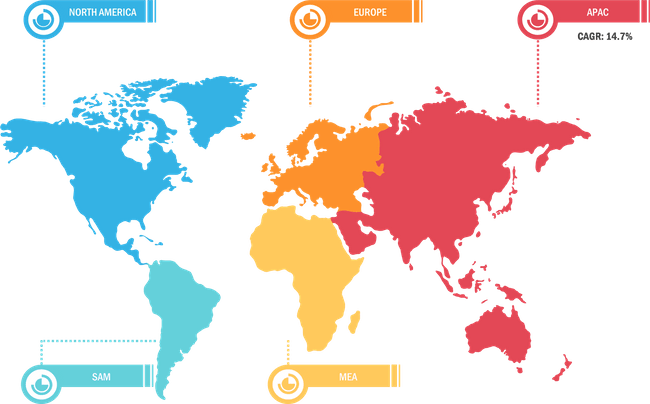Lucrative growth in Southeast Asian Countries Drives Market Growth
According to our latest market study on “Halal Cosmetics Market Forecast to 2028 – COVID-19 Impact and Global Analysis – by Application,” the halal cosmetics Market size is expected to grow from US$ 36,686.54 million in 2022 to US$ 79,861.73 million by 2028; it is estimated to register a CAGR of 13.8% from 2022 to 2028. The report highlights key factors driving the halal cosmetics market growth and prominent players along with their developments in the market.
Halal cosmetic products must not contain ingredients derived from pig, carrion, blood, human body parts, predatory animals, reptiles, and insects among others. Cosmetic ingredients derived from permissible animals must be slaughtered according to Islamic law to be considered halal. Halal cosmetics have witnessed significant adoption among the Muslim population owing to the increasing demand for personal grooming and trending cosmetic and beauty products that adhere to religious loyalties. These factors are expected to drive the halal cosmetics market growth in the forecast period.
Global Halal Cosmetics Market Breakdown – by Region
Halal Cosmetics Market Size and Forecasts (2020 - 2030), Global and Regional Share, Trends, and Growth Opportunity Analysis Report Coverage: By Product Type (Skincare, Haircare, Makeup, and Others), Category (Men, Women, and Unisex), Distribution Channel (Supermarkets and Hypermarkets, Specialty Stores, Online Retail, and Others), and Geography
Halal Cosmetics Market by Size, Share & Trend Analysis 2028
Download Free Sample
Clara International Beauty Group; Inglot Cosmetics; Inika Organic Australia; IVY Beauty Corporation; MMA Bio Lab Sdn Bhd; OnePure, LLC; PT Paragon Technology and Innovation; PHB Ethical Beauty Ltd.; Sampure Minerals; and IBA Cosmetics are a few key players operating in the global halal cosmetics Market. The halal cosmetics market players are focusing on providing high-quality products to fulfill customer demand. They are also adopting strategies such as investments in research and development activities and mergers & acquisitions. For instance, in June 2021, the skin care company Flora & Noor introduced a line of halal skin care. The company offers body products like body butter, scrubs, and bath bombs, in addition to cleansers, toners, serums, moisturizers, and masks. Such innovations by key market players boost the halal cosmetics market share in the forecast period.
Impact of COVID-19 Pandemic on Halal Cosmetics Market
The COVID-19 pandemic adversely affected economies and industries in various countries. Lockdowns, travel restrictions, and business shutdowns in North America, Europe, Asia Pacific (APAC), South & Central America, and the Middle East & Africa (MEA) hampered the growth of several industries, including the food & beverage, healthcare, and cosmetics. Manufacturers of halal cosmetics faced significant challenges due to supply chain constraints caused by nationwide lockdowns, trade bans, and travel restrictions. The supply chain disruptions created a shortage of raw materials, affecting the production and distribution ofhalal cosmetics, leading to increased prices. Moreover, bans on international imports and export in many countries interrupted halal cosmetics supply during the COVID-19 pandemic. Various halal cosmetic manufacturers had to temporarily close their operations or limit their production capacities, which negatively impacted the halal cosmetics market growth. Also, in the early period of the crisis, manufacturers were majorly dependent on the existing inventory.
In 2021, several economies resumed operations as governments announced relaxations in the previously imposed restrictions, which boosted the global marketplace. Moreover, manufacturers were permitted to operate at full capacities, which helped them overcome the demand and supply gap and other repercussions. As a majority of the global population was fully vaccinated by 2021, the halal cosmetics manufacturers focused on increasing their production to revive their businesses.
The report includes the segmentation of the global halal cosmetics market as follows:
The global halal cosmetics market is segmented on the basis of application and geography. Based on application, the market is segmented into food & beverages, food packaging, biomedical, cosmetics, and others. By geography, the global halal cosmetics market is broadly segmented into North America, Europe, Asia Pacific, the Middle East & Africa, and South & Central America. The market in Middle East & Africa region is expected to grow at fastest CAGR with rapidly expanding e-commerce platforms, rapidly increasing Muslim population, and growing consumer preference for natural & effective cosmetic products. Moreover, growing awareness about the harmful ingredients used in conventional cosmetics are the primary factor expected to drive the halal cosmetics market. Furthermore, the expanding awareness about halal cosmetics in generation-Z non-Muslim populations and the increasing variety of halal cosmetic products available for different age groups are expected to drive demand for halal cosmetics and boost overall market during the forecast period.
Contact Us
Phone: +1-646-491-9876
Email Id: sales@theinsightpartners.com